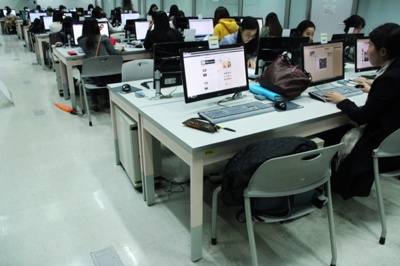Privatization in computer labs inconveniences students

Students are raising complaints about loose management of computer labs on campus, consistently reporting problems about unofficial reserving of seats by students—a practice known as “privatization”—and are unauthorized use of computers by visitors. Insufficient rules against “privatization” and visitors’ access have contributed to the shortage of computers available in the labs. The lines of those waiting for a seat in major buildings such as the Ewha Campus Complex (ECC) and the Ewha-POSCO Building are much longer than usual especially during exam periods, when computer labs are most crowded with students. Moreover, a few computers often seem not in use but unavailable due to personal belongings on the desk indicating it as already taken. Such “privatization” of seats prevails in computer labs even though it clearly inconveniences many students. “I waited around 30 minutes, but there were still no computers available,” said Yoon Hyun-jee (Economics, 2), who had been in line for the computer lab in the Ewha-POSCO Building. “What frustrates me even more is I saw about six computers available, but they were all marked ‘reserved’ by the piles of personal belongings people had left.” Teaching Assistants (TAs) monitor labs during the entire operating hours and try to prevent seat “privatization” by notifying users through messages not to leave seats for too long, as others are waiting. While the assistants agree that “privatization” is an easily recognized practice, they explain that it is not feasible to stop it. “I always see about five to 10 computers ‘privatized,’ but it is difficult to keep track of the time each user is on and off with so many people using the lab,” said a computer lab T.A. who wishes to remain anonymous. “Sometimes, students waiting in line complain about a specific computer from which a user has been gone for a long time. We then move in and make it available, which is the best we can do.”Students also call for stronger measures against visitors from outside Ewha who trespass the computer labs. Each computer lab has a student card reader installed with the intention of letting only Ewha students to use the facilities, but such has been ineffective. According to the TAs, fewer than half of the students have their student cards scanned. “Because the card reader only checks whether or not one is a Ewha student, it cannot strictly prevent a visitor from entering,” the TA said. “I often find visitors in the lab and request them to leave.” Although many students have experienced such inconveniences, changes have not been made yet. The Office of Information and Communications (OIC) explains that a seat reservation system can alleviate such problems, for it allows only Ewha students to be issued a seat as the system operates by using the student card and limits the use time. Such system is currently being used at reading rooms and a computer lab in the Ewha Womans University Library. “Because computer labs are located in almost every building, a seat reservation system seemed unnecessary,” said an OIC official in charge of the computer lab management. “However, since some of the labs are especially crowded these days, we have a plan to employ the system next year.”

